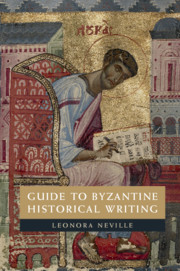Book contents
- Frontmatter
- Dedication
- Contents
- Acknowledgments
- Introduction
- Byzantine Historical Texts
- 1 Theophylakt Simokatta
- 2 Paschal Chronicle
- 3 George Synkellos
- 4 Chronicle of Theophanes
- 5 Patriarch Nikephoros
- 6 Scriptor Incertus de Leo V
- 7 Chronicle of 811
- 8 Megas Chronographos
- 9 George the Monk
- 10 Peter of Alexandria
- 11 Genesios
- 12 Theophanes Continuatus
- 13 Constantinian Excerpts
- 14 John Kaminiates
- 15 Symeon the Logothete
- 16 Leo the Deacon
- 17 Chronicle of Monemvasia
- 18 Chronicon Bruxellense
- 19 Psellos
- 20 John Xiphilinos
- 21 Michael Attaleiates
- 22 John Skylitzes and Scylitzes Continuatus
- 23 George Kedrenos
- 24 Nikephoros Bryennios
- 25 Anna Komnene
- 26 John Kinnamos
- 27 John Zonaras
- 28 Constantine Manasses
- 29 Michael Glykas
- 30 Eustathios of Thessaloniki
- 31 Joel
- 32 Niketas Choniates
- 33 George Akropolites
- 34 Theodore Skoutariotes
- 35 George Pachymeres
- 36 Nikephoros Gregoras
- 37 Ephraim
- 38 Constantine Akropolites the Grand Logothete
- 39 Chronicle of Morea
- 40 Nikephoros Kallistos Xanthopoulos
- 41 John VI Kantakouzenos
- 42 Michael Panaretos
- 43 Chronicle of Ioannina
- 44 Chronicle of Tocco
- 45 John Kananos
- 46 John Anagnostes
- 47 Leontios Machairas
- 48 Sylvester Syropoulos
- 49 Doukas
- 50 George Sphrantzes
- 51 Michael Kritovoulos
- 52 Laonikos Chalkokondyles
- Appendix A Time Periods Covered in the Histories
- Appendix B Timeline of Authors’ Lives
1 - Theophylakt Simokatta
from Byzantine Historical Texts
Published online by Cambridge University Press: 14 June 2018
- Frontmatter
- Dedication
- Contents
- Acknowledgments
- Introduction
- Byzantine Historical Texts
- 1 Theophylakt Simokatta
- 2 Paschal Chronicle
- 3 George Synkellos
- 4 Chronicle of Theophanes
- 5 Patriarch Nikephoros
- 6 Scriptor Incertus de Leo V
- 7 Chronicle of 811
- 8 Megas Chronographos
- 9 George the Monk
- 10 Peter of Alexandria
- 11 Genesios
- 12 Theophanes Continuatus
- 13 Constantinian Excerpts
- 14 John Kaminiates
- 15 Symeon the Logothete
- 16 Leo the Deacon
- 17 Chronicle of Monemvasia
- 18 Chronicon Bruxellense
- 19 Psellos
- 20 John Xiphilinos
- 21 Michael Attaleiates
- 22 John Skylitzes and Scylitzes Continuatus
- 23 George Kedrenos
- 24 Nikephoros Bryennios
- 25 Anna Komnene
- 26 John Kinnamos
- 27 John Zonaras
- 28 Constantine Manasses
- 29 Michael Glykas
- 30 Eustathios of Thessaloniki
- 31 Joel
- 32 Niketas Choniates
- 33 George Akropolites
- 34 Theodore Skoutariotes
- 35 George Pachymeres
- 36 Nikephoros Gregoras
- 37 Ephraim
- 38 Constantine Akropolites the Grand Logothete
- 39 Chronicle of Morea
- 40 Nikephoros Kallistos Xanthopoulos
- 41 John VI Kantakouzenos
- 42 Michael Panaretos
- 43 Chronicle of Ioannina
- 44 Chronicle of Tocco
- 45 John Kananos
- 46 John Anagnostes
- 47 Leontios Machairas
- 48 Sylvester Syropoulos
- 49 Doukas
- 50 George Sphrantzes
- 51 Michael Kritovoulos
- 52 Laonikos Chalkokondyles
- Appendix A Time Periods Covered in the Histories
- Appendix B Timeline of Authors’ Lives
Summary
This classicizing history covers the reign of Maurice (582–602) in eight books, focusing on wars with the Avars and the Persians. It survives in a twelfth- century manuscript and two later copies. In the manuscript the work is titled Ecumenical History. When the ninth- century scholar Photios described the work, however, he called it Histories.
The title of this text describes its author as Theophylakt the apo eparchon and antigrapheus. These high- ranking titles indicate the author had a career in the imperial administration in Constantinople. The title of one of his other works describes him as a scholastikos, or lawyer. Photios recorded that Theophylakt was born in Egypt. The Suda, a tenth- century dictionary, lists Simokatta as Theophylakt's surname. The history mentions that one of the author's relatives held the position of Augustalis under Emperor Maurice (582– 602). In addition to the history, Theophylakt wrote a theological treatise, an essay on natural oddities, and a collection of fictional letters between historical and mythical characters.
The preface indicates that the history was intended as a continuation of the sixth- century historian Menander. In classicizing style, Theophylakt's history contains numerous set speeches and descriptions of battles. He also, however, intersperses stories of miracles in a way that weaves specifically Christian interpretations of events into classical models of historical writing.
Theophylakt's history was written in the reign of Heraclius and seems to reflect the politics of its time of composition. Maurice, the main subject of Theophylakt's history, was murdered along with his children by the usurper Phokas in 602. When Phokas (602– 611) was overthrown in turn by Heraclius (611– 641), Heraclius appears to have tried to honor the memory of Maurice. The last event mentioned in the history took place in 628. Whitby and Treadgold date the composition to the early 630s while Olajos and Schreiner prefer a range in the late 630s through early 640s.
The history is preceded in the manuscript by a dialogue between Philosophy and History. Some scholars consider the dialogue to be a separate text rather than an introduction to the history.
- Type
- Chapter
- Information
- Guide to Byzantine Historical Writing , pp. 47 - 51Publisher: Cambridge University PressPrint publication year: 2018



